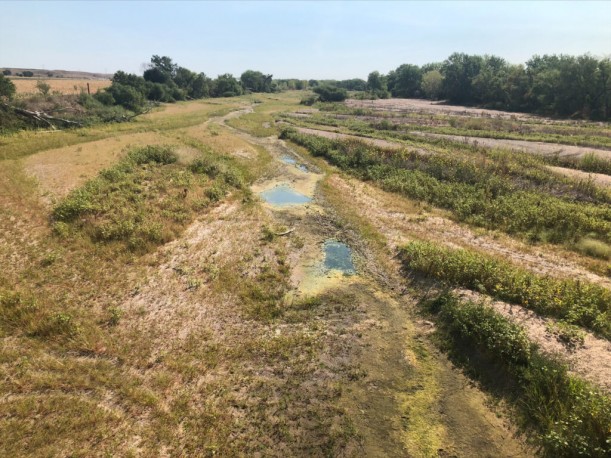Catholic Support For Science-Based City Climate Action Plan For Omaha

Drought conditions in 2022 dried up the flows in the South Platte River east of Ogallala, near Roscoe. (Courtesy Nebraska Governor’s Office)
Fall in Nebraska is a special time to experience and give thanks for our natural environment. It is fitting that between Sept. 1 and Oct. 4, the Catholic Church celebrates the Season of Creation. Anticipating this time, we draw on the Church’s wisdom to advocate for an Omaha City Climate Action and Resilience Plan that, at minimum, comprehensively peaks greenhouse gas emissions by 2025, cuts emissions 50% from 2019 levels by 2030 and reaches net zero carbon by 2040.
In 1990, St. John Paul II affirmed consensus climate science that the “’greenhouse effect’ has now reached crisis proportions as a consequence of industrial growth, massive urban concentrations and vastly increased energy needs.” He then appealed for a “comprehensive plan of action.” Since then, and in solidarity with many non-Catholics, Pope Benedict XVI, Pope Francis and the U.S. Conference of Catholic Bishops have reiterated this call.
The U.S. bishops’ climate change teachings explicitly appeal to prudence. Saint Thomas Aquinas (1225-1274) drew on Aristotle to define prudence as “right reason applied to action.” Today, prudence entails comprehensive science-based climate policy.
The Nobel Prize-winning Intergovernmental Panel on Climate Change (IPCC) — representing 198 member countries, over 700 expert report authors and over 14,000 peer-reviewed journal articles — calculates that human activities have warmed the planet 1.1°C (2°F) since the Industrial Revolution. This warming is already causing, and will continue to cause, effects that hit especially close to home here in Omaha, a city especially known for agriculture, health care and defense.
Current warming is already causing glacial melt, rising seas and more frequent and intense severe weather events like droughts. These and other effects are now causing humanitarian crises like agricultural strains, water stresses, population displacement and health maladies like heat-related deaths. Since these realities can stoke violence, the U.S. Department of Defense calls climate change a “national security threat.”
The IPCC cautions that warming beyond 1.5°C (2.7°F) will likely cause rapidly accelerating warming and potentially irreversible, catastrophic effects. For this reason, more than 230 international scholarly medical journals jointly declared in 2021 that “the greatest threat to global public health is the continued failure of world leaders to keep the global temperature rise below 1.5°C.”
To have at least a 50% chance of avoiding such disaster, the IPCC concludes the world must take immediate action and: 1) peak global greenhouse gas emissions before 2025, 2) cut global greenhouse gas emissions in nearly half from 2019 levels by 2030, and 3) achieve net zero carbon emissions by midcentury at the latest. Net zero carbon requires eliminating 90% of direct emissions and offsetting no more than 10% through sequestering actions like tree planting. Prudence thus requires “comprehensive plans of action” that at minimum achieve these objectives.
Numerous institutions across Nebraska, including Creighton University and College of Saint Mary, are actively discerning strategies to curb greenhouse gas emissions. To protect public health, CommonSpirit, the parent system of CHI Health, has committed to cut its operational greenhouse gas emissions in half by 2030 and reach net zero greenhouse gas emissions by 2040.
Although such non-governmental actions are important, Catholic teaching stresses that prudent environmental policies by government are essential. This is because, as Saint John Paul II emphasized, “It is the task of the State to provide for the defense and preservation of common goods such as the natural and human environments.” Similarly, Pope Benedict XVI observed, “It is not hard to see that environmental degradation is often due to the lack of far-sighted official policies.”
Simply put, the world cannot avoid catastrophic climate change that unimaginably harms agriculture, health, security and many other aspects of society unless all levels of government commit to science-based greenhouse gas reduction targets.
To prudently conserve our common home, we urge the City of Omaha to adopt a Climate Action and Resilience Plan that, at minimum, comprehensively peaks greenhouse gas emissions by 2025, cuts emissions 50% from 2019 levels by 2030 and reaches net zero carbon by 2040.
This editorial was originally published by Nebraska Examiner, an editorially independent newsroom providing a hard-hitting, daily flow of news. It is part of the national nonprofit States Newsroom. Find more at nebraskaexaminer.com.
Category:
User login
Omaha Daily Record
The Daily Record
222 South 72nd Street, Suite 302
Omaha, Nebraska
68114
United States
Tele (402) 345-1303
Fax (402) 345-2351




